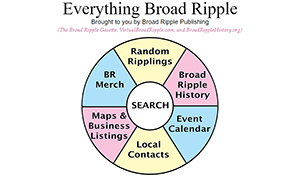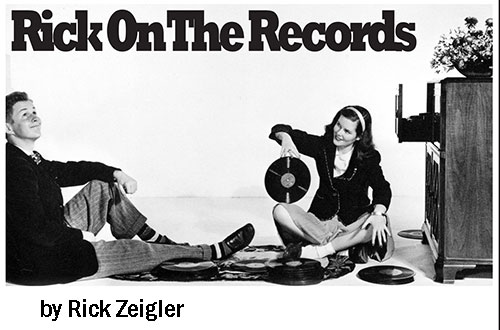
|
Broad Ripple Random Ripplings

The news from Broad Ripple
Brought to you by The Broad Ripple Gazette
(Delivering the news since 2004, every two weeks)

|
| Brought to you by: |

|

|

|

|

|

|
Converted from paper version of the Broad Ripple Gazette (v03n18)
Rick On The Records - by Rick Zeigler
posted: Sept. 08, 2006

BOB DYLAN-MODERN TIMES
What can one expect from a new Dylan album in the 21st century?
After 30 studio albums, one might be tempted to answer, "Not much". However, Dylan has always been a masterful artist in defying one's expectations. This holds true with his newest effort, Modern Times.
Certainly the sound of the album (produced by Dylan under the pseudonym Jack Frost) is of a piece with his previous two efforts, Time Out Of Mind and Love And Theft. Like the latter album, Dylan is backed by his current touring band, which gives the album a relaxed, easy-going feel for the majority of the songs.
So what is different here? Most importantly, the concluding song, "Ain't Talkin'" is simply one of the best songs he has ever written. It is also the longest song on the album, and, in addition to an absolutely beautiful melody, it has the same elegiac feel that largely suffused Dylan's last truly great recording, Blood On The Tracks. Like the tunes on that album, "Ain't Talkin'" takes a narrative form, but does not really tell a story so much as unfold a series of observations and multi-layered visions. For instance, near the end of the song Dylan says "As I walked out in the mystic garden/On a hot summer day, a hot summer lawn/Excuse me ma'am I beg your pardon/There's no one here, the gardener is gone". Here there can be allusion to religious feeling ("mystic garden") and its absence in the modern world, to the absence of anyone truly tending to what needs tending to (politics/the Iraq war?) in modern life, to the feeling that one's personal "garden" may be missing its tender, and even to the 70's country-pop song, "I Never Promised You A Rose Garden". Like any great lyric, any of these (and certainly other) interpretations can be correct depending on the thoughts and mood of the listener and, presumably, the writer. And like other great songs of his, Dylan also includes himself within the catalogue of troubles to which he is trying to give voice. There are lines full of religious connotations such as "I'm trying to love my neighbor and do good unto others/But, oh mother, things ain't going well," and "If I catch my opponents ever sleeping/I'll just slaughter them where they lie." The lyrical masterstroke of this song, however, is its title, as when the chorus has Dylan offering that he, "Ain't talkin', just walkin'/Through this weary world of woe." What could be less literally true of Dylan's art than the claim that he "ain't talkin',"? For it is, of course, his lyrics which power his work. And yet, on the song containing his finest set of words in years, Dylan seems to suggest that making such observations is simply how he moves in the world, how he 'walks'. Such a claim makes the importance of what he says seem simultaneously unimportant (he's just walkin'), and yet so much more important than just "talkin'," since the words are a product of what comes naturally to the writer. Catching such contradictions in lyrical form has always distinguished Dylan's greatest songs.
So what of the rest of the album? While nothing else is as arresting as this final tune, gems are present throughout. Most songs take a country-blues or jazz shuffle approach, with only the excellent, stripped-down "Nettie Moore" recalling the folkier focus for which he is most famous. Amusingly, "Workingman's Blues #2" is one of the few songs on the album that has little basis in the blues, being primarily a stately pop concoction reminiscent in feel (though not in sound) to "It's All Over Now Baby Blue". Dylan also injects good doses of humor throughout, as when he says he is 'searching" for Alicia Keys in the opening track or, in the rockabilly-like "Rollin' & Tumblin," when he states "I got trouble so bad I just can't stand the strain/Some young lady slut has just charmed away my brains." And while some may see "When The Levee Breaks" as Dylan's comment on the tragedy of New Orleans, there is nothing akin to a direct reference to that particular event. This makes the song a comment on life's tragedies rather than on a specific tragedy, a truly Dylan-like approach. One can only conclude that Dylan is not done yet in providing us with music and art that, in yielding no easy answers to our questions about life, the world, and "modern times," still deepens our understanding of just what those questions are really all about.
Rick Zeigler, along with his wife, Jeanne, owns Indy CD and Vinyl at 806 Broad Ripple Avenue. Back in his musician days, his band opened for the likes of U2, XTC, Gang Of Four, The Pretenders, Los Lobos, and, um, Flock Of Seagulls, among others. You can read all of Rick's reviews at www.indycdandvinyl.com. Email your music questions and comments to rick@BroadRippleGazette.com
rick@broadripplegazette.com

|

|

|
| Brought to you by: |

|

|

|
| Brought to you by: |

|

|

|


